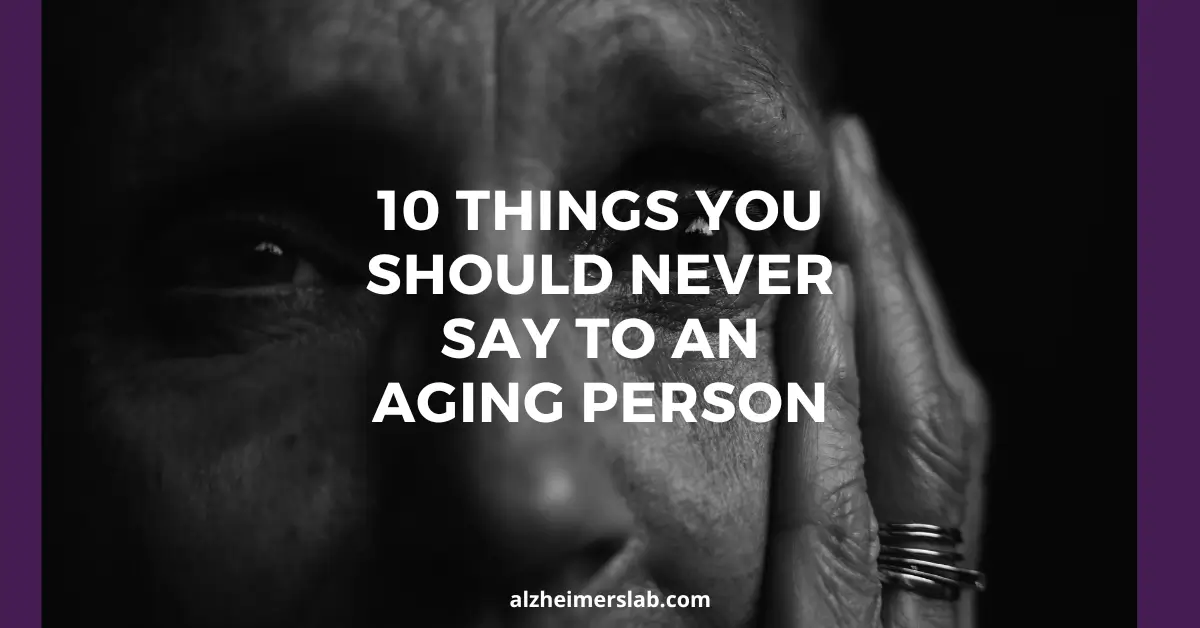10 Things You Should Never Say to an Aging Person (And What to Say Instead)
Never say, “You’re too old for that.”
It might seem like a harmless comment, but telling an aging person they’re “too old” can hurt more than you think. It sounds like you’re putting a limit on them—and nobody wants that, no matter their age.
Let’s talk about what not to say, why it matters, and how to be more respectful and kind in your conversations with older adults.
Why Your Words Matter
Older people hear age-related comments more often than you might realize. It’s called ageism, and it shows up in everyday conversations. Even when someone means well, their words can still sting.
When you say something like, “You still drive?” or “You don’t look that old,” it may seem like a compliment or a joke. But it can come across as dismissive or patronizing.
1. “You’re Too Old for That”
This one tops the list. Whether it’s about someone trying a new hobby, dating, using technology, or just wearing something fun—this phrase is a confidence killer.
Better to say:
“That’s cool you’re giving that a try!”
Let them enjoy their freedom and choices.
2. “You Still Work?”
This might sound like curiosity, but it often feels like judgment. Many older adults work because they want to, not because they have to.
Why it’s a problem:
It assumes they should have stopped being productive by now. That’s not fair.
Better to say:
“What do you enjoy most about your work?”
3. “You’re Not That Old”
It seems like a compliment—but it can sound like you’re minimizing their experience. Age comes with wisdom, and people should be proud of it.
Instead say something like:
“You’ve seen so much in your life. That’s amazing.”
That way, you show respect rather than trying to sugarcoat.
4. “You Probably Don’t Remember”
Never assume memory loss. Yes, some aging adults do deal with memory problems, but not all do—and even if they do, it’s hurtful to point it out.
Why it’s insulting:
It makes the person feel like you don’t trust their mind or value what they know.
A better approach:
“Do you remember when…?” Give them the chance.
5. “At Your Age?”
This phrase usually pops up when someone older wants to travel, dance, exercise, or do something unexpected.
What it really sounds like:
“You should slow down and stop enjoying life.”
Let people live. Age isn’t a stop sign.
Say instead:
“That’s awesome! How did it go?”
6. “You’re So Cute!”
Older adults aren’t puppies or toddlers. Saying they’re “cute” can feel demeaning—even if you mean it in a sweet way.
The issue:
It sounds like you’re talking down to them. Many seniors want to be taken seriously.
Better compliment:
“You have a beautiful smile” or “You’re looking great today.”
7. “How Are You Feeling?” (Every Single Time)
It’s good to check in, but constantly asking about health makes it feel like that’s all you care about.
Why it gets old fast:
It can make the person feel like they’re defined by their age or their aches and pains.
Mix it up:
Talk about books, shows, family, hobbies—anything besides just health.
8. “Let Me Do That for You”
Sometimes this is helpful. But other times, it can feel like you’re assuming they can’t do anything on their own.
Why it can feel bad:
It takes away their independence, especially if they didn’t ask for help.
Try instead:
“Would you like a hand with that?” That gives them the choice.
9. “You’re Aging So Well” or “You Don’t Look Your Age”
It might seem like a compliment, but think about what it really says. That aging is bad, and they’ve somehow managed to escape it.
Better to say:
“You have such great energy” or “You seem so full of life.”
Focus on qualities, not age.
10. “It’s Too Late for That Now”
Whether it’s about going back to school, starting a business, or learning something new—this phrase shuts people down.
Why it’s harmful:
It discourages growth and curiosity. And that never goes away, no matter how old someone is.
Say this instead:
“Go for it! What inspired you?”
How to Catch Yourself Before You Say It
Sometimes we say things without realizing how they sound. That’s okay—we all make mistakes. But once you know better, it’s good to pause and think.
Ask yourself these questions before you speak:
- Would I say this to someone my age?
- Does this sound like I’m doubting their ability?
- Am I assuming something just because of their age?
If the answer is “yes,” try to rephrase.
When in Doubt, Just Be Respectful
Aging isn’t a bad thing. It’s a natural part of life. The goal isn’t to walk on eggshells—it’s to be kind, thoughtful, and respectful.
Older adults don’t want pity. They don’t want to be babied. Most just want to be treated like the full, capable humans they are.
Final Thoughts
If someone you care about is aging—whether it’s your parent, grandparent, neighbor, or friend—listen more than you talk. Pay attention to what lights them up and what shuts them down.
The words you use can either build them up or wear them down. So be the kind of person who makes them feel strong, smart, and seen.
And if you ever do say the wrong thing, just apologize. Then do better next time.

